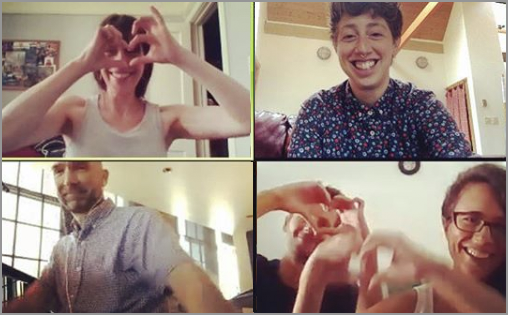Back in the 1990s, my teenage self always looked forward to Tuesdays. Partly, I just liked them. But Tuesday was also the day when a friend-of-a-friend updated his website, and this was always a treat.
This guy, who I never actually met in the real world, posted funny stories from his life once a week. He had amassed a following of literally hundreds of people from around the world, each eagerly awaiting the appearance of his emails in their super cool Hotmail inboxes.
He had created a blog before blogs really existed, merely by typing stories in raw HTML and emailing a manually-updated list. Somehow, people stumbled across it via wonky 1990s search engines, and his audience grew and grew.
Inspired by his success, I started my own website. A grand total of two people ever read it. Given the immaturity of analytics in those days, both of them were probably me.
I soon gave up, and justified it by believing that I was simply too late. Clearly, this guy had completely dominated the telling-stories-on-the-internet market. Perhaps I’d have succeeded if I started earlier—say, in 1995 or so.
By 1999, I had missed the boat. Nobody would ever become famous on the internet again.

With hindsight, it is possible to admit that 1999 wasn’t actually too late, and that there just may have been a market for blogs even after that. It’s hard to believe, but it may also be true that people weren’t interested in whatever ramblings my past self was inflicting on the early internet.
However, the belief that I’d missed my chance persisted long after this particular episode. In the mid-2000s, I watched bloggers rise to fame in much the same way again. I observed their ascents, thinking, I could have been one of you, but it’s clearly too late now.
In fact, I remember thinking something like “I didn’t miss the blogging boat in 1999, but I’ve definitely missed it now!” I was wrong then, too.
Afterwards, I thought the same of YouTubers, long before we even called them YouTubers. Then I watched Twitch streamers rise to prominence, with the same internal chorus echoing: “There’s no point me joining in now, this space is clearly already saturated. I’d just disappear into the crowd. I needed to start years ago. I’ll just wait for the next thing, so I can be ahead on that.”
But that wasn’t true either! Not only was I wrong about each of these examples, my belief in my perpetual tardiness persisted even in situations when I was a legitimate early adopter. For example, I joined the famous anxiety factory, twitter.com, very early, and I still believed I’d shown up too late. Part of me just assumes I’ve missed my chance, no matter what is actually happening.
Examples of this are most common on the internet, where a big new thing has appeared every few years for my entire existence, but this dynamic shows up in other areas of my life too. Whether I’m learning physics, writing books, or doing standup comedy, I always see everyone else as having left me behind on their journey towards success. I feel stranded, wishing I’d shown up in time to join them on the only boat that would ever be.

Of course, this is all nonsense. It’s not even hard to see the flaw in my logic.
The wrong belief at the heart of this is something like ‘it’s impossible to become successful in a field where other people are already successful.’ As with many unquestioned beliefs, it sounds ridiculous the second I write it down. Yet it has outsized power when I allow it to go unchecked.
It’s also easy to disprove. After all, there are countless examples of new people bypassing the leaders in any given field. For a start, every successful athlete started out as nobody in a space dominated by existing legends in their sport. Each of them had to work to rise to prominence.
Returning to one of my internet examples, the guy with the most subscribers ever on Twitch only started a couple of years ago… several years after I mentally wrote it off as too late for me.
Ancient humans also conspired to make me look silly, by coming up with proverbs like “the best time to plant a tree is a hundred years ago, the second best time is now”. People figured that out thousands of years ago. Why am I still struggling with it today?
To be fair to myself, one reason that these beliefs are so powerful is that they are sometimes true. It is possible to miss chances! For example, at this point I have to concede that I am unlikely to ever become a professional athlete.
I think my brain takes the reasonable possibility of missing a chance and applies it to every situation, regardless of whether it’s applicable or not. But why?

One possibility is that part of me is so afraid of missing chances that I see it everywhere. I could believe that.
Or it could be that I’m unconsciously looking for excuses. Sometimes it’s more comforting to not try, rather than to try and fail.
But…what if it’s neither of those, and my brain is actually right? I am actually missing chances constantly. These misses are so frequent that it arguably makes sense for my mind to automatically assume I already missed out on whatever I’d like to do.
This isn’t as ridiculous as it may sound. Every day, I make choices which remove countless possibilities from the future. If I go to one café for a muffin, then I can’t go to another café for a croissant. (Well, I can. But I can’t do them both at the same time.)
I can only live one variation of all the possibilities for each day, so in practice I’m missing uncountable chances all the time. In that context, it makes sense that my brain just assumes I’m too late by default. It’s in the habit of thinking “oh I can’t do that anymore” for most things I could conceivably have done.
Internal processes are hard to describe, but I think this one goes something like this:
- I dream of something I might like to do.
- My brain mentally draws a path from the past to a present where I’ve already succeeded—in other words, I imagine myself starting years ago, doing all the hard work required in the intervening years, and then reaping the rewards right now.
- I think “Wow, I’m nowhere near that! I haven’t done any of that work! And doing it would take ages! Clearly I should have started years ago, just like I imagined I did in my head a moment ago. Oh well, too late on this one, I’d better go do something else instead.”
Again, this sounds silly when I say it aloud. It makes no sense to compare an imaginary path to success—where the hard work is done by an imaginary version of my past self—to the genuine reality in which I have to sit down and do the work to achieve anything. But I can see why my brain might be tempted to do it.

My new internal flowchart goes something like this: Am I actually too late for a thing? If yes—like with athletics, or whatever—accept it. If not, do the thing. If I don’t actually want to do the thing, then don’t. This sounds like a simple system, but it’s surprisingly hard to stick to.
I can imagine traveling back to the 1990s and being ahead of the curve on every possible innovation. But I can’t do that in reality. Instead, I have to recognize that the only moment is now, and get on with achieving my goals, whether it seems like others are ahead of me or not.
Your turn
Do you ever worry that, if others are too far ahead, it’s not worth starting something new? Are you afraid of having missed out? Share with the community in the comments.

Doing/being/exploring ALL THE THINGS is easier with a community!

Did you know we have a private community of hundreds of multipotentialites from around the world? We support each other, share advice and cheer each other on as we building lives and career around ALL our passions.
Learn more about the Puttyverse and get notified next time we open the doors:


I think of this kind of thing all the time! Thanks for writing – loved this!
Thanks Nancy!
Thank you so much for the right word at this season in life. I turn 60 this year and have often wondered thought I missed my chance, but time, college in my late 40s and several successful late starters to encourage me and I’m stepping out and trying things anyway. My mind still fights the process but most days I do it anyway.
Yes. Good for you! I concur. I started some new stuff at 60 and some more at 70 and was just commenting about some of them…
Ahh I really appreciate this Susy. I suppose we may always feel this way and, like you say, it’s about stepping out and trying things anyway.
Yes. I can relate to much of this. But I’ve done some things right, too. Like I started a blog when I was 60 – which was in 2010 – and it’s still active. Yah, with only 2 or 3 readers probably, but I can often convince myself that’s okay because I’m writing for me. And then almost a year ago, I decided to write a book about that decade – which was a cool one for more reasons than my blog. I used those blog posts and journal entries to build the skeleton of that memoir. It is now in the final stages of revision before going public. How fun! Maybe more than three people will read the book. Maybe. AND today I’m agonizing over the process of getting the Kindle version live – because maybe a dozen people would read that format. … At any rate, I can relate to what you’ve written here. Indeed I have to remind myself that, while I might really wish I were farther along, I can only start where I am.
Fantastic, Kaye! I love the acceptance of writing for yourself and for those that come along on the journey, and it’s wonderful that it has turned into a book for you. I hope more than a dozen people read it – drop me a message when it’s out so I can have a look myself 😀
I can’t start at the finish line. It’s always perfectly fine to be a beginner. If others are successful I can be too.
What a great way of putting it, thanks 🙂
Love it Neil!
Just one question to consider…..define ‘success’.
It’s a common narrative these days to see ourselves as behind when we are actually often ahead. Liberation comes from doing things that you enjoy, that develop new skills, that help achieve a sense of mastery. That could be the ability to run 5 km as opposed to qualifying for the marathon in the next Olympics. But importantly, it’s good to try to avoid comparisons with others. We are all running our own race in the end aren’t we?!
Absolutely! I think defining success is a theme I’ve returned to again and again, and I still keep getting drawn into other people’s definitions before remembering that it’s mine that matter in the end to me. Thanks for the reminder 🙂